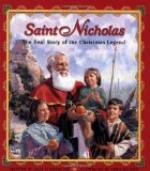The disciples of Joseph as they gathered about their fire of an evening often told how, at night, as he prayed, the prison chamber had been filled with a light brighter than that of the sun, and Jesus himself had appeared to him and had led him forth unharmed to his own house in Arimathea.
And sometimes they told how, again imprisoned, he had been fed from the Holy Cup from which the Saviour had drunk at the “last sad supper with his own” and in which Joseph had caught the blood of his Master when he was on the cross, and how he had been blest with such heavenly visions that the years passed and seemed to him as naught.
Now after a certain time he had been released from prison; but there were people who still doubted him and so with his friends, Lazarus and Mary Magdalene and Philip and others, he had been driven away from Jerusalem. The small vessel, without oars, rudder or sail, in which they had been cast adrift on the Mediterranean, had come at last in safety to the coast of Gaul. And for many years since then had Joseph wandered through the land carrying ever with him two precious relics, the Holy Grail and “that same spear wherewith the Roman pierced the side of Christ.” Now at last with a chosen band of disciples he had reached the little-known island of the Britons.
Landing from their little boat in the early morn on this unknown coast, they had knelt upon the shore while Joseph “gave blessing to the God of heaven in a lowly chanted prayer.” Then, “over the brow of the seaward hill” they had passed, led by an invisible hand and singing as they went. All day through dark forests and over reedy swamps they had made their way and now at nightfall, tired and wayworn, they rested on the ridgy hill which has ever since been known by the name of Wearyall.
During the long day’s march they had seen but few of the people of the land and these had held aloof.
Now, suddenly, the silence was broken by loud cries and shouts, and groups of the native Britons, wild and uncouth in appearance, their half-naked bodies stained blue with woad, were seen coming from different directions up the hill. They were armed with spears, hatchets of bronze, and other rude weapons of olden warfare and, as they came rapidly nearer, their threatening aspect and menacing cries startled the pilgrim band. Rising hastily, as though they would flee, the men looked in terror, one toward another. Joseph alone showed no trace of fear and, obedient to a sign from him, they all knelt in prayer upon the hillside.
Then, thrusting his thorny staff into the ground beside him and raising both hands toward heaven, Joseph claimed possession of this new land in the name of his Master, Christ.
“‘This staff hath borne me long and well,’
Then spake that saint divine,
’Over mountain and over plain,
On quest of the Promise-sign;
For aye let it stand in this western land,
And God do no more to me
If there ring not out from this realm about,
Tibi gloria, Domine.’”




